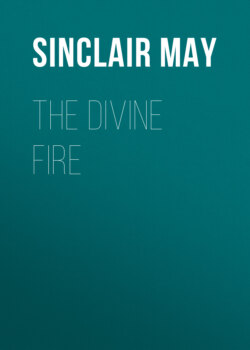Читать книгу The Divine Fire - Sinclair May - Страница 8
На сайте Литреса книга снята с продажи.
CHAPTER IV
ОглавлениеTable of Contents
A wave of heat broke from the pillar-stove and spread through the shop, strewing the heavier smells like a wrack behind it. And through it all, with every swing of the great mahogany doors, there stole into his young senses a something delicious and disturbing, faintly discernible as the Spring.
He thrust his work from him, tilted back his chair at a dangerous angle, and began reviewing his engagements for the coming Bank Holiday.
He was only three and twenty, and at three and twenty an infinite measure of life can be pressed into the great three days. He saw in fancy the procession of the hours, the flight of the dreams, of all the gorgeous intellectual pageants that move through the pages of Saturnalia. For in ninety-two Savage Keith Rickman was a little poet about town, a cockney poet, the poet not only of neo-classic drama, but of green suburban Saturday noons, and flaming Saturday nights, and of a great many things besides. He had made his plans long beforehand, and was prepared to consign to instant perdition the person or thing that should interfere with them. Good Friday morning, an hour's cycling before breakfast in Regent's Park, by way of pumping some air into his lungs, then, ten hours at least of high Parnassian leisure, of dalliance in Academic shades; he saw himself wooing some reluctant classic, or, far more likely, flirting with his own capricious and bewildering muse. (In a world of prose it is only by such divine snatches that poets are made) Friday evening, dinner at his club, the Junior Journalists'. Saturday morning, recovery from dinner at the Junior Journalists'. Saturday afternoon, to Hampstead or the Hippodrome with Flossie Walker, the little clerk, who lived in his boarding-house and never had any fun to speak of. Saturday night, supper with—well, with Miss Poppy Grace of the Jubilee Variety Theatre. He had a sudden vision of Poppy as he was wont to meet her in delightful intimacy, instantaneously followed by her image that flaunted on the posters out there in the Strand, Poppy as she appeared behind the foot-lights, in red silk skirts and black silk stockings, skimming, whirling, swaying, and deftly shaking her foot at him. Midnight and morning merging into one. Sunday, to Richmond, probably, with Poppy and some others. Monday, up the river with Himself. Not for worlds, that is to say, not for any amount of Poppies, would he have broken his appointment with that brilliant and yet inscrutable companion who is so eternally fascinating at twenty-three. Monday was indistinct but luminous, a restless, shimmering background for ideas. Ideas! They swarmed like motes in the blue air; they loomed, they floated, vague, and somewhat supernaturally large, all made out of Mr. Rickman's brain. And in the midst of the ideas a figure insanely whirled, till it became a mere wheel of flying skirts and tossing limbs.
At this point Mr. Rickman caught the cashier's eye looking at him over the little mahogany rails of his pew, and he began wondering how on earth the cashier would behave when they loosed him out for the Bank Holiday. Then he set to and wrote hard at the Quarterly Catalogue. In all London there was not a more prolific or versatile writer than Savage Keith Rickman. But if in ninety-two you had asked him for his masterpiece, his magnum opus, his life-work, he would mention nothing that he had written, but refer you, soberly and benignly, to that colossal performance, the Quarterly Catalogue.
"Vandam: Amours of Great Men (a little soiled). Rare. 30s." He was in the middle of the Vs now and within measurable distance of the end. Business being slack in the front shop, he finished earlier than usual, and actually found himself with nearly a whole hour upon his hands before dinner. He had half a mind to spend it at his club, the Junior Journalists', in the side street over the way.
Only half a mind; for Mr. Rickman entertained the most innocent beliefs with regard to that club of his. He was not yet sure whether it belonged to him or he to it; but in going to the Junior Journalists' he conceived himself to be going into society. So extreme was his illusion.
Mr. Rickman's place was in the shop and his home was in a boarding house, and for years he had thought of belonging to that club; but quite hopelessly, as of a thing beyond attainment. It had never occurred to him that anything could come of those invasions of the friendly young men. Yet this was what had come of them. He was friends, under the rose, that is to say, over the counter, with Horace Jewdwine of Lazarus College, Oxford. Jewdwine had proposed him on his own merits, somebody else had seconded him (he supposed) on Jewdwine's, and between them they had smuggled him in. This would be his first appearance as a Junior Journalist. And he might well feel a little diffident about it; for, though some of the members knew him, he could not honestly say he knew any of them, except Rankin (of The Planet) who possibly mightn't, and Jewdwine who certainly wouldn't, be there. But the plunge had to be made some time; he might as well make it now.
From the threshold of the Junior Journalists' he looked back across the side street, as across a gulf, at the place he had just left. His eyes moved from the jutting sign-board at the corner, announcing Gentlemen's Libraries Purchased, to the legend that ran above the window, blazoned in letters of gold:
Isaac Rickman: New & Second-Hand Bookseller.
His connexion with it was by no means casual and temporary. It was his father's shop.
